If you notice a sudden change in your baby’s stool pattern, it lasts for more than a couple of days, and it’s accompanied by warning signs such as fever, irritability, pain to the touch and vomiting, you might need to call your doctor, as they might be experiencing a different underlying health issue.
Is Your Newborn Not Pooping but Passing Gas? Possible Causes Explained
By: Dr. Maria Cerino - Updated April 21, 2024 - 13 Minute Read
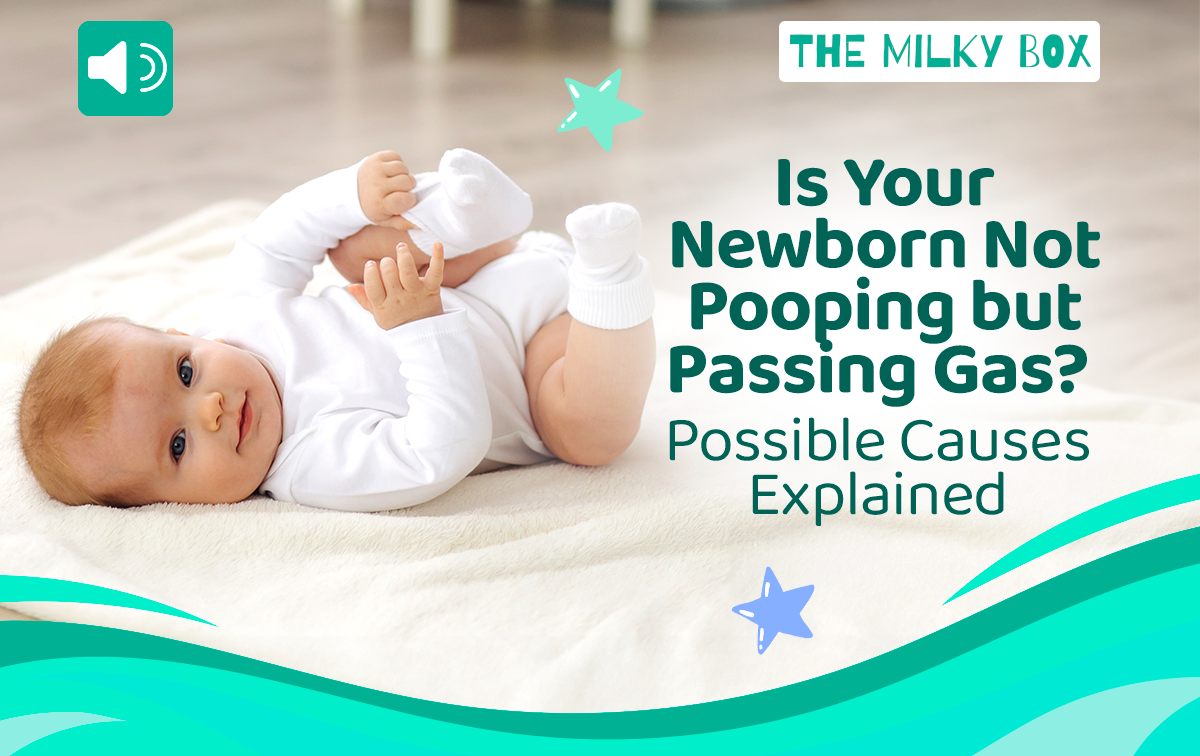
If there’s anything to say about parenthood, a big part of it consists of staying in tune with your baby’s bowel movement schedule. For some, it becomes a constant source of worry: Is the consistency, okay? Are they constipated? Is organic formula the best for their belly?
In this article, we’ll discuss every parent's most searched topic. Let’s begin!
Table of Contents:
1. How do I know if My Newborn is Gassy or Constipated?
2. When Should you Worry About a Newborn not Pooping?
3. Possible Reasons Your Baby is Not Pooping but Passing Gas
4. Is it Normal for a Breastfed Baby to Not Poop for Days?
5. Breastfed, Formula-Fed, or Solids-Fed Baby Not Pooping?
6. How Long Can a Baby Go Without Pooping?
7. Change the Type or Brand of Formula Milk
8. Treatment for Infrequent Pooping in Babies
9. Does Gripe Water Help Baby Poop?
10. Foods that Soften the Stools
11. In Conclusion…
12. Frequently Asked Questions
How do I Know if My Newborn is Gassy or Constipated?
When it comes to newborn constipation, it’s difficult to tell, especially for first-time parents. We must remember that a baby’s digestive system is still maturing and barely adapting to the real world. It takes them just a few weeks to get used to digestion, so don’t be scared if you can’t quite find a pattern yet.
It’s entirely normal for newborns to pass gas. While it might seem like it’s a sign of constipation, it’s often part of the digestive system’s function, a way of getting rid of the extra air they might take in during feeding. Sometimes, a gassy baby is just trying to get rid of that.
It's crucial to recognize the signs and symptoms of constipation, which include bloating, persistent crying, a hard and rigid abdomen, reluctance to feed, and dry, pellet-like poop. Not addressing these symptoms can lead to discomfort and pain for your little one.
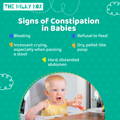
Here are Some General Characteristics that Indicate that Your Baby's Poops are Healthy
Your baby’s poop should be:
● Breastfed babies poop will pass soft and runny but not watery. This is perfectly normal.
● Breastfed baby poop is considered normal when it's a mustard yellow, green or brown color.
● Healthy breastfed stools will smell sweet (unlike regular bowel-movement odor).
● Formula-fed babies will pass stools with a peanut butter-like consistency. This is healthy and normal.
● Formula poop can vary in color, but it should be in the yellow, green, or light brown range.
● Depending on the variation of the formula, different smells are expected. It’s part of their digestion.
Breast milk is a natural laxative. It’s so easy to digest that babies will experience frequent pooping. Newer formulas with high-quality ingredients are getting good at helping your baby follow this pattern, too, although it might still differ slightly.
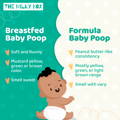
When Should you Worry about a Newborn not Pooping?
While skipping one day is normal, you should contact your qualified provider as soon as possible if your baby's stool contains any of the following:
● Blood in stool
● Excess water or mucus in stool
● Refusal to feed at all
● White or grey stool
● Fever
● Excess crying that can’t be soothed at all
● Lethargic baby
● Baby cries when you touch their abdomen
● Constipation accompanied by vomiting
● Newborns who don’t pass any stools in the first 48 hours
● Hard, “board like” abdomen
● if your baby is struggling to gain weight at all
● If a baby younger than 4 months poops less than 3 times per week

Possible Reasons Your Baby is Not Pooping but Passing Gas
If your baby is passing gas and they’re feeding adequately, it might be a sign of their digestive systems waking up. It’s important to remember newborns have no experience with air until they take their first breath. If they swallow some air when they cry or feed, eventually, some of the air comes up as a burp.
However, sometimes this isn’t enough. Newborns look for ways to get rid of this gas. It’s why they ball up, grunt, turn red, or wake up in the middle of the night and scream until they eventually produce loud burps or gas. It’s part of the process.
Some gas produced as small remnants of milk remain in their digestive system and feed the (good) bacteria in the gut. They produce wind as they utilize this as energy. Thus, the gas cycle starts. This is normal. However, excessive gas can happen also and it may be a sign that the digestive system is struggling.
In such instances, you may want to talk with your qualified provider about supporting their digestion with probiotics and digestive enzymes to take some burden off of their immature systems that are still developing.

Is It Normal for a Breastfed Baby to Not Poop for Days?
If a baby is under six weeks and exclusively breastfeeding, this might be a sign of distress.
If they just began feeding, you might need to check with your doctor, as this might mean an issue with their digestive tract. However, it can also mean they’re not eating enough, as they’re utilizing every last drop of their milk for energy. If your baby sleeps through the night, the number of daytime feeds will need to be increased to ensure adequate milk intake.
It’s always a good idea to consult your qualified provider if the pooping frequency declines suddenly. Parents become great at noticing patterns, and if you notice a sudden change, particularly if accompanied by extra fussiness or refusal to feed, it’s a good idea to get in touch with your medical provider.
Breastfed, Formula-Fed, or Solids-Fed Baby Not Pooping?
Depending on your baby’s diet, their bowel movements will change. We’ve created this informative chart to help you remember the normal frequency and identify the most common patterns of changes in bowel movements.

How Long Can a Baby Go Without Pooping?
A baby’s pooping frequency will change every few weeks, depending on their phase of development. Here’s a general guide on what to look for:
● During the first 48 hours of their lives, they will pass a substance called “meconium” as a stool. It should be dark green or almost black and sticky in consistency. This is perfectly normal, a marker that the digestive system is working.
● Week 1-6: This is the most difficult stage for parents, as babies will poop as often as ten times per day. There is a slight difference in frequency depending on your baby’s largest source of caloric intake. Formula-fed babies will go up to 5 to 8 times a day. Breastfed babies will be going up to twelve per day for the first month.
● From week six: Parents will be relieved as the number of dirty diapers will slow down a little bit before the two-month mark. Babies will need to poop every other day; they might even skip a day in between. This is perfectly normal.
● Six months onwards: Their pooping frequency will become more regular as solids are introduced. It’s important to provide natural sources of fiber, such as fruits and veggies, to ensure their digestive system adapts. Avoiding overprocessed foods will be easier on their digestive system, even more so during their first year of life.
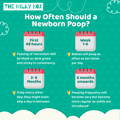
It’s important to note that some healthy babies past their first three months will have only one bowel movement a week. When bowel movements are less frequent, they should be soft, easy to pass, and more profuse in volume.
Change the Type or Brand of Formula Milk
If you observe any gastrointestinal issues like constipation or diarrhea in your baby, you might need to switch to a different baby formula. One possible explanation for this change could be a sensitivity to one of the formula ingredients, like cow’s milk or iron-fortified formulas, which can lead to lactose intolerance.
In case of lactose intolerance, you may notice that your baby starts spitting it up, has a change in bowel movements, or refuses to feed. This may be followed by pain to the touch or swelling in their belly after feeding and increased crying.
Switching Baby Formula
It’s important to note that when you just get started with a new formula, they may experience some fussiness and discomfort, but this should go away after the first few feeds. It’s never a bad idea to contact your qualified provider before switching out formulas, especially if there is a pain or digestive concern.
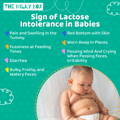
Baby formula for Lactose Intolerance
Suppose you and your healthcare provider are looking for alternative baby formulas beyond the traditional cow's or goat's milk. You should feel reassured that European baby formula manufacturers know this need and are expanding their product range. They are creating new recipes to address allergies and intolerances, such as cow's milk protein allergy (CMPA) and lactose intolerance.
These plant-based formulas alleviate digestive concerns in even the most delicate infants. They are made with organic, milk-free, dairy-free, lactose-free, and soy-free ingredients and comply with EU infant regulations to ensure optimal physical growth and healthy cognitive development.

Treatment For Infrequent Pooping in Babies
Now that we’ve defined the most commonly expected characteristics of a baby’s bowel movements, it’s important to mention there are a few things we can do if we notice our baby’s pattern is less consistent.
Under 6 Months
For infants on formula and breastmilk, you need to burp them appropriately after every meal, give them warm baths, and move their legs in a bicycle motion to stimulate digestion. If an infant is supplemented or fully dependent on baby formula, it might be necessary to evaluate the formula they are consuming to ensure it is appropriate for their needs.
It's normal to experience differences in how your baby's body digests formula, as every baby's digestive system works differently. Finding the right formula for your baby can be a trial-and-error process, and many parents switch formulas at least three times during the liquid diet stage. Don't worry; this is common, and you'll eventually find the best formula for your baby.
Over 6 Months
When babies start eating solid foods, it's important to introduce them to fiber-rich foods that can aid their digestion and overall health. Fruits like bananas, pears, and plums are excellent sources of fiber, along with small sips of 100% fruit juice. These foods can provide the necessary nutrients for your baby's growing body and promote healthy bowel movements.
It is worth restating that these foods should only be considered if your baby is over six months old, as their digestive system is still developing.
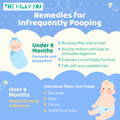
Home Remedies for Infrequent Pooping
There are a few things you can try at home to improve your baby's digestion. These don’t require special materials and are simple enough to be harmless.
1. A warm bath with epsom salts: Giving your baby a warm bath can relax their abdominal muscles and relieve any discomfort. Epsom salts help relax the smooth muscles of the GI tract and can also help with fussiness and sleep troubles.
2. Exercise: This is a tried-and-true method. You can try moving your baby’s legs gently in a bicycle motion, this can activate their bowels and help them out.
3. Hydration: This only applies to babies old enough to consume solids. A few sips can help them get rid of any hard stool smoothly.
4. Abdominal Massage: When done gently, this stimulates the digestive tract and soothes any discomfort; it helps you gauge pain if there is any.
How do you Massage a Baby to Poop?
If you are not familiar with belly massage, don't worry. It's not something we usually do, but with proper guidance, it can be quite effective. It is important to apply minimal pressure, as the body needs to be handled gently.
Here's how to do it:
1. Use your fingertips to make circular motions around the belly button in a clockwise pattern.
2. Hold the baby’s knees and feet together and gently push the feet toward the belly.
3. Stroke from the rib cage down past the belly button with the edge of a finger.
You can first try for a few minutes and see how your baby feels. At any sign of discomfort, you must stop, and this can be a sign of pain and, therefore, a different underlying issue.
Does Gripe Water Help Baby Poop?
No, doctors do not recommend gripe water, as it has been heavily associated with infantile colic, vomiting, and constipation. Mineral oil is not recommended either, as it has been known to cause serious health issues such as diarrhea, vomiting, and intense pain.

Foods that Soften the Stools
If your baby is old enough for solids now, this is great news. There’s nothing like natural foods to aid their digestion. You might want to try including organic, fiber-rich foods into their diet; these will help their intestines get things moving.
● Peaches
● Plums
● Prunes
● Bananas
● Pureed broccoli
● Pureed carrots
● Oatmeal for babies closer to one year of age
● 1-2 Oz of prune or apple juice (only in babies older than six months)
In Conclusion…
Babies can experience constipation as they go through different stages of development. They are sensitive to changes in their feeding habits, such as switching from breast milk to formula, switching between formulas, stress from traveling, and irregular sleeping patterns. However, it's normal for babies to have inconsistent bowel movements, especially before they start eating solid foods.
If you are concerned about your baby's digestive issues, such as lactose intolerance, TheMilkyBox.com offers organic baby formula to help alleviate these issues. However, it is recommended that you consult a pediatrician before making any significant changes to your baby's diet. They can provide additional support and guidance to ensure your baby's health and well-being.
Frequently Asked Questions
If my baby stops pooping abruptly, should I be worried?
Is passing gas a sign of constipation?
Not at all. Passing gas means their digestive system is working. They’re digesting, and the good bacteria in their gut is also making use of their ingested milk. It can also be a sign of them swallowing air during crying and feeding. Both are completely normal.
My baby is lactose intolerant. Can he drink any formula at all?
Yes. Fortunately, there are many great formulas made for them. They contain just as many nutrients as calories as other formulas, making sure their nutrition is on par with their expected growth goals. One option can be plant-based formulas or hypoallergenic formulas with reduced lactose content.
Why is my breastfed’s baby poop so liquidy?
During the first months, you will notice this consistency and might think they’re experiencing diarrhea. It’s completely normal. Since their diet is all liquids and breast milk is too easy to digest, it doesn’t form any poop as we know it. You might also notice the quantity is very small if they constantly have bowel movements; this is because they use up pretty much almost all their milk and little left to eliminate.
Disclaimer:
Please be aware that this information is based on general trends in babies, and it is not medical advice. Your doctor should be your first source of information and advice when considering any changes to your child’s formula and when choosing your child’s formula. Always consult your pediatrician before making any decisions about your child’s diet or if you notice any changes in your child.
Breastfeeding is the best nutrition for your baby because breast milk provides your child with all the essential nutrients they need for growth and development. Please consult your pediatrician if your child requires supplemental feeding.

Dr. Maria Cerino is a medical doctor and a researcher from Mexico, her works being published in prestigious journals like the American Journal of Human Biology among others. As a medical writer, Dr. Cerino focuses on infant nutrition and healthy neurological development in infants and children. In her free time, she enjoys going on walks, watching indie films, and cooking at home.
Read Next:
Reviewed by Dr. Eric Wood, ND, MA

Dr. Wood is a licensed naturopathic doctor, with a doctorate degree from the Canadian College of Naturopathic Medicine in Toronto, Canada. He received his post-graduation certification in Mind Body Medicine at Harvard University.
With 15 years of experience, Dr. Wood is an Associate Professor of Holistic Nutrition at the American College of Health Sciences in Portland, Oregon. Dr. Wood is an educator, clinician, author, media figure, consultant, and owns his own holistic (naturopathic) medical practice in Ft. Lauderdale, Florida. Dr. Wood is currently researching and drafting books on cancer and pediatrics.
Outside of the medical profession, Dr. Wood loves singing with the Miami Lyric Opera and is an avid musician in South Florida. He also loves spending time with his wife and kids.

